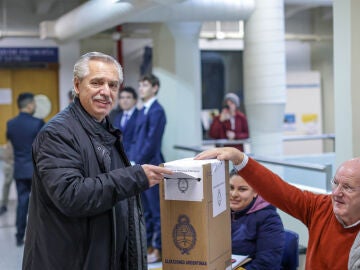
La Libertad Avanza, the coalition led by the far-right Javier Milei, has been the formation with the most votes in the primary elections in Argentina, with 30.10% of the votes, ahead of the Together for Change coalition (center-right), which achieved 28.27% of the votes. However, these are not the elections as such: they are the PASO elections (primary, open, simultaneous and mandatory), which were held in Argentina on Sunday August 13, and to which some 35.4 were called to vote. Millions of Argentines
Primary elections serve to formalize the candidates ahead of the presidential elections. On December 10, the current mandate ends, thus the Government of Alberto Fernández ends. This is Argentina’s electoral calendarLooking ahead to the coming months:
- On September 17 begins the electoral campaign in Argentina
- The first mandatory presidential debate is held on October 1
- A second presidential debate is held on October 8, also mandatory
- From October 14 polls or electoral polls cannot be published
- The electoral campaign ends on October 20 at 08:00 and the electoral ban begins, the day of reflection in Argentina
- The presidential elections take place on October 22.in the first round
- The final results of the first round must be known on November 3
- In case there is no clear winner, a second round (ballot) on November 19
- He December 10 the inauguration ceremony should be held, when the president-elect begins his term
What does the candidate need to win in the first round?
For the presidential elections in Argentina, a candidate you need to get 45% of the votes to be elected president. In the case of not reaching this threshold, a candidate can be elected in the first round if he exceeds 40% of the votes and has a difference of less than 10 percentage points with the second in the race.
If none of these circumstances apply, a second round is held which, in 2023, would be called for November 19. In this case, a ‘ballotage’ is held, that is, only the two most voted formulas attend the second round in the first round, and the one with the most votes wins.
Who are the candidates for the elections in Argentina?
- Javier Milei and Victoria Villarruel: is the winning formula of the PASO elections. They are the candidates of La Liberta Avanza, a coalition made up of the Libertarian Party (Milei), the Democratic Party (Villarruel), the Celeste and White Union, the Faith Party, the Federal Renewal Party, and other conservative and liberal forces.
- Sergio Massa and Agustin Rossi: is the formula made up of the current Minister of Economy and the head of the cabinet of ministers, of the Renovation Front and the Justicialista Party, respectively. It is a coalition made up of different parties under the umbrella of Unión por la Patria, of a Peronist nature.
- Patricia Bullrich and Luis Petri: are the candidates of Together for Change, made up of the Republican Proposal, the Radical Civic Union and other parties.
- Juan Schiaretti and Florencio Randazzo: is the formula made up of the Christian Democratic Party, the Autonomist Party and the Socialist Party.
How elections work in Argentina
Presidential elections in Argentina are held by direct suffrage, that is, the voters vote directly for a formula made up of two candidates, one for the presidency and the other for the vice-presidency. Native Argentines can vote from the age of 16, while those who have obtained Argentine nationality can do so from the age of 18. The presidential mandate in Argentina lasts four years.
Unlike what happens in Spain, In Argentina it is mandatory to vote: all those over 18 and under 70 are required to participate in the elections in Argentina. Those who do not participate in the democratic process receive a economic sanction and are included in a register of offenders; In addition, the ability to be designated for any public job is lost for three years in case of not voting and whoever does not pay the fine will not be able to carry out “managements or procedures before the national, provincial and autonomous city of Buenos Aires state agencies during one year”.
However, there are exemptions when voting in Argentina: native Argentines over 16 and under 18, and also those over 70, are not required to vote. It is also possible to request an exemption as long as the voter is more than 500 kilometers from their polling station; when the voter is sick or disabled; when he works in a public service organization or company and due to labor issues he cannot attend to vote and the judges or assistants who have to attend his office on election day.
Source: Lasexta
Ricardo is a renowned author and journalist, known for his exceptional writing on top-news stories. He currently works as a writer at the 247 News Agency, where he is known for his ability to deliver breaking news and insightful analysis on the most pressing issues of the day.












